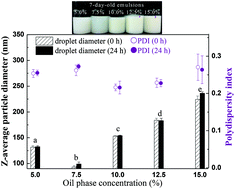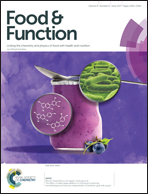γ-Oryzanol nanoemulsions produced by a low-energy emulsification method: an evaluation of process parameters and physicochemical stability
Abstract
γ-Oryzanol is a natural antioxidant and nutraceutical compound, which makes it a good candidate for nutraceuticals, food supplements and pharmaceutical preparations. However, the incorporation of γ-oryzanol into aqueous formulations is rather difficult and its bioavailability can be severely decreased because of its water-insoluble property. In this study, γ-oryzanol-enriched nanoemulsion based fish oil and medium-chain triglyceride as carrier oils were proposed. The main objective was to optimize process parameters to form stable nanoemulsions and evaluate their physicochemical stability. The formulations of stable γ-oryzanol nanoemulsions were composed of 10% mixed carrier oils (weight ratio of fish oil to medium-chain triglyceride = 3 : 7) and 10% mixed surfactants (weight ratio of Tween 80 to Span 20 = 3 : 1). The nanoemulsions were stable at a broad pH range of 2–7 and high salt concentrations (≤0.8 mol L−1) and sucrose levels (≤16%). The nanoemulsions were much more stable at heating temperatures below 50 °C than at elevated heating temperatures (60 and 70 °C). The nanoemulsions maintained their physical stability at various storage temperatures (5–37 °C) for 18 days. Nanoemulsions at 5 and 23 °C had lower peroxide values and anisidine values than those at an elevated storage temperature (37 °C). These results demonstrate that the low-energy emulsification method can produce γ-oryzanol-enriched nanoemulsions using fish oil and medium-chain triglyceride as carrier oils, and provide useful information for producing bioactive lipids-loaded nanoemulsions for food systems, personal care and pharmaceutical products.



 Please wait while we load your content...
Please wait while we load your content...